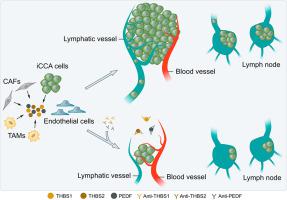Journal of Hepatology ( IF 25.7 ) Pub Date : 2021-07-28 , DOI: 10.1016/j.jhep.2021.07.016 Guido Carpino 1 , Vincenzo Cardinale 2 , Alessandra Di Giamberardino 3 , Diletta Overi 4 , Samantha Donsante 3 , Tania Colasanti 5 , Gaia Amato 6 , Gianluca Mennini 7 , Matteo Franchitto 8 , Fabrizio Conti 5 , Massimo Rossi 7 , Mara Riminucci 3 , Eugenio Gaudio 4 , Domenico Alvaro 6 , Carmine Mancone 3

|
Background & Aims
The microenvironment of intrahepatic cholangiocarcinoma (iCCA) is hypovascularized, with an extensive lymphatic network. This leads to rapid cancer spread into regional lymph nodes and the liver parenchyma, precluding curative treatments. Herein, we investigated which factors released in the iCCA stroma drive the inhibition of angiogenesis and promote lymphangiogenesis.
Methods
Quantitative proteomics was performed on extracellular fluid (ECF) proteins extracted both from cancerous and non-cancerous tissues (NCT) of patients with iCCA. Computational biology was applied on a proteomic dataset to identify proteins involved in the regulation of vessel formation. Endothelial cells incubated with ECF from either iCCA or NCT specimens were used to assess the role of candidate proteins in 3D vascular assembly, cell migration, proliferation and viability. Angiogenesis and lymphangiogenesis were further investigated in vivo by a heterotopic transplantation of bone marrow stromal cells, along with endothelial cells in SCID/beige mice.
Results
Functional analysis of upregulated proteins in iCCA unveils a soluble angio-inhibitory milieu made up of thrombospondin (THBS)1, THBS2 and pigment epithelium-derived factor (PEDF). iCCA ECF was able to inhibit in vitro vessel morphogenesis and viability. Antibodies blocking THBS1, THBS2 and PEDF restored tube formation and endothelial cell viability to levels observed in NCT ECF. Moreover, in transplanted mice, the inhibition of blood vessel formation, the de novo generation of the lymphatic network and the dissemination of iCCA cells in lymph nodes were shown to depend on THBS1, THBS2 and PEDF expression.
Conclusions
THBS1, THBS2 and PEDF reduce blood vessel formation and promote tumor-associated lymphangiogenesis in iCCA. Our results identify new potential targets for interventions to counteract the dissemination process in iCCA.
Lay summary
Intrahepatic cholangiocarcinoma is a highly aggressive cancer arising from epithelial cells lining the biliary tree, characterized by dissemination into the liver parenchyma via lymphatic vessels. Herein, we show that the proteins THBS1, THBS2 and PEDF, once released in the tumor microenvironment, inhibit vascular growth, while promoting cancer-associated lymphangiogenesis. Therefore, targeting THBS1, THBS2 and PEDF may be a promising strategy to reduce cancer-associated lymphangiogenesis and counteract the invasiveness of intrahepatic cholangiocarcinoma.
中文翻译:

血小板反应蛋白 1 和 2 与 PEDF 一起抑制肝内胆管癌中的血管生成并促进淋巴管生成
背景与目标
肝内胆管癌 (iCCA) 的微环境血管不足,具有广泛的淋巴网络。这导致癌症迅速扩散到区域淋巴结和肝实质,从而排除了治愈性治疗。在这里,我们研究了 iCCA 基质中释放的哪些因子会抑制血管生成并促进淋巴管生成。
方法
对从 iCCA 患者的癌性和非癌性组织 (NCT) 中提取的细胞外液 (ECF) 蛋白进行定量蛋白质组学。计算生物学应用于蛋白质组数据集,以识别参与调节血管形成的蛋白质。用来自 iCCA 或 NCT 标本的 ECF 孵育的内皮细胞用于评估候选蛋白在 3D 血管组装、细胞迁移、增殖和活力中的作用。通过骨髓基质细胞的异位移植以及 SCID/米色小鼠的内皮细胞在体内进一步研究了血管生成和淋巴管生成。
结果
iCCA 中上调蛋白的功能分析揭示了由血小板反应蛋白 (THBS)1、THBS2 和色素上皮衍生因子 (PEDF) 组成的可溶性血管抑制环境。iCCA ECF 能够抑制体外血管形态发生和活力。阻断 THBS1、THBS2 和 PEDF 的抗体将管形成和内皮细胞活力恢复到在 NCT ECF 中观察到的水平。此外,在移植的小鼠中,血管形成的抑制、淋巴网络的从头生成和 iCCA 细胞在淋巴结中的传播被证明取决于 THBS1、THBS2 和 PEDF 的表达。
结论
THBS1、THBS2 和 PEDF 可减少 iCCA 中的血管形成并促进肿瘤相关淋巴管生成。我们的结果确定了新的潜在干预目标,以抵消 iCCA 中的传播过程。
总结
肝内胆管癌是一种高度侵袭性的癌症,起源于胆管树的上皮细胞,其特征是通过淋巴管扩散到肝实质。在这里,我们显示蛋白质 THBS1、THBS2 和 PEDF 一旦在肿瘤微环境中释放,就会抑制血管生长,同时促进癌症相关的淋巴管生成。因此,靶向 THBS1、THBS2 和 PEDF 可能是减少癌症相关淋巴管生成和对抗肝内胆管癌侵袭性的有希望的策略。



























 京公网安备 11010802027423号
京公网安备 11010802027423号